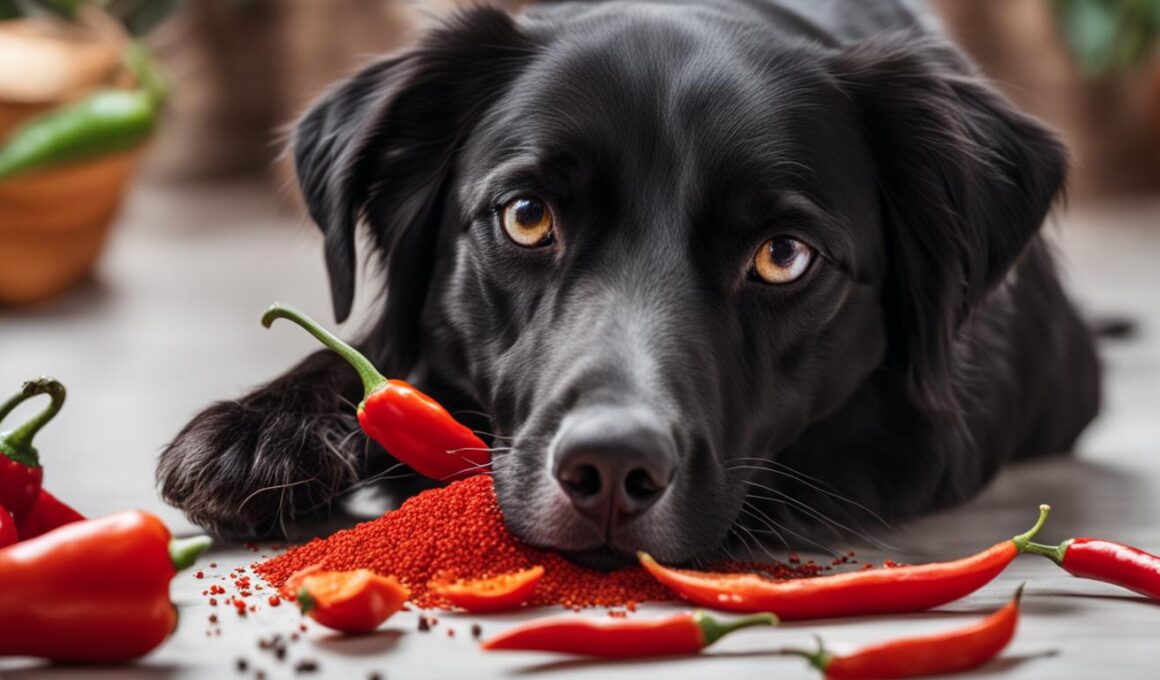Welcome to our comprehensive guide on the topic of dogs and paprika consumption. Many pet owners wonder, “Can dogs eat paprika?” In this article, we will explore whether paprika is safe for dogs, the potential effects of paprika on dogs, and recommendations for dogs consuming paprika.
Paprika, a popular spice derived from dried sweet peppers, belongs to the nightshade family. While humans enjoy the flavor and aroma of paprika in various dishes, it is important to understand its potential impact on our furry friends.
Is Paprika Safe for Dogs to Eat?
Paprika itself is not poisonous to dogs. However, it’s essential to understand the potential risks associated with feeding paprika to your furry friend.
While paprika may not be toxic, its consumption can cause stomach upset in dogs, particularly if it contains spicy chilies. Some common symptoms dogs may experience after ingesting paprika include vomiting, diarrhea, and gas.
Although these symptoms are not usually life-threatening, it’s best to avoid intentionally feeding paprika to dogs, as it can cause discomfort and potential digestive issues.
Instead of paprika, there are safer options to consider when it comes to treating your dog. Bell peppers can be a nutritious alternative, offering essential vitamins and nutrients. Red bell peppers, in particular, have numerous health benefits for dogs. They are rich in antioxidants, vitamins A, B6, C, E, lutein, beta-carotene, and minerals.
When feeding bell peppers to your dog, it’s important to do so in moderation. Too much can cause digestive issues. Additionally, it’s crucial to remove the seeds and stems before feeding them to your furry companion.
By opting for bell peppers, you can provide your dog with a safe and nutritious alternative to paprika. Remember, the well-being of your pet should always be a top priority.
Seasonings and Herbs Safe for Dogs
When it comes to seasoning your dog’s food or incorporating herbs into their diet, it’s important to know which ones are safe and beneficial. There are several seasonings and herbs that are suitable for dogs and can add flavor and nutritional value to their meals.
Safe Seasonings for Dogs:
- Anise seeds
- Sweet basil
- Chamomile
- Cilantro
- Cinnamon
- Dill
- Ginger
- Mint
- Parsley
- Peppermint
- Rosemary
- Sage
- Thyme
- Turmeric
Herbs Suitable for Dogs:
- Anise seeds: Known for its soothing properties and ability to aid digestion.
- Sweet basil: Contains antioxidants and has antimicrobial properties.
- Chamomile: Calming herb that can help with anxiety and digestive issues.
- Cilantro: Rich in vitamins A, C, and K, as well as antioxidants.
- Cinnamon: Anti-inflammatory spice that can help regulate blood sugar levels.
- Dill: Promotes digestion and freshens breath.
- Ginger: Eases nausea and can help with joint pain and inflammation.
- Mint: Freshens breath and aids digestion.
- Parsley: Contains vitamins A, C, and K, as well as antioxidants.
- Peppermint: Soothes an upset stomach and helps with bad breath.
- Rosemary: Rich in antioxidants and can help improve digestion.
- Sage: Provides antimicrobial benefits and supports oral health.
- Thyme: Contains antioxidants and has antimicrobial properties.
- Turmeric: Anti-inflammatory spice that can help with arthritis and cancer prevention.
On the other hand, there are certain seasonings that should be avoided as they can be harmful to dogs:
- Allspice
- Bay leaf
- Cayenne
- Cocoa or cocoa powder
- Chives
- Cloves
- Curry
- Garlic
- Hops
- Marjoram
- Mustard
- Nutmeg
- Onion
- Oregano
- Pumpkin pie spice
- Salt
- Spanish thyme
While paprika itself is not toxic to dogs, it may contain spicy chilies that can cause stomach upset. Therefore, it’s recommended to avoid any situation where dogs might consume paprika.
Is Paprika Safe for Dogs to Consume Like Raspberries?
Conclusion
In summary, while paprika itself is not toxic to dogs, its consumption can lead to digestive upset, particularly if it contains spicy chilies. It’s important to be cautious when feeding paprika to dogs and consider alternative options that are both safe and nutritious.
Bell peppers, for example, are a great alternative to paprika for dogs. They are rich in essential vitamins and minerals, making them a healthy treat option. However, it’s crucial to feed bell peppers to dogs in moderation and remove the seeds and stems to prevent any potential digestive issues.
Furthermore, when it comes to seasonings and herbs, there are certain options that are safe for dogs in small amounts. However, it’s important to avoid certain seasonings that can be harmful, such as garlic, onion, and nutmeg. Consulting with a veterinarian is always recommended to ensure the best feeding practices for your furry friend.
Overall, while paprika can be safely consumed by dogs in moderation, it’s important to consider the potential risks and opt for alternative options that are known to be safe and beneficial for their health. Prioritizing their well-being and consulting with a professional will help ensure that your dog’s diet remains balanced and free of any harmful ingredients.









